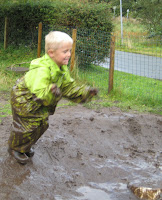 We made another (mercifully bike-free) stop on our study tour at Børnehaven Østerladen, a Danish childcare center in northern Jutland. Although Børnehaven directly translates to "kindergarten," this piece of abandoned farmland is unlike any kindergarten I've ever seen. The kids, all three through six, tromped freely through pools of mud until every one of their neon rain suits was coated in brown. Some of the boys were playing a game that involved swinging branches of trees at each others' heads. I saw one girl fall headfirst off of the back of the monkey bars then stand up, look a little dizzy, shake it off, stumble for a few steps, and run away. Pens of chickens and free-ranging goats roam alongside the kids.
We made another (mercifully bike-free) stop on our study tour at Børnehaven Østerladen, a Danish childcare center in northern Jutland. Although Børnehaven directly translates to "kindergarten," this piece of abandoned farmland is unlike any kindergarten I've ever seen. The kids, all three through six, tromped freely through pools of mud until every one of their neon rain suits was coated in brown. Some of the boys were playing a game that involved swinging branches of trees at each others' heads. I saw one girl fall headfirst off of the back of the monkey bars then stand up, look a little dizzy, shake it off, stumble for a few steps, and run away. Pens of chickens and free-ranging goats roam alongside the kids.  We spent only a short time at the kindergarten and I'm sure that the presence a group of thirty tall, mostly dark-haired people asking, "Hvad hedder du?" and "Hvor gammel er du?" again and again in bastardized Danish wasn't calming the playground mood. But coming from a city where kids now experience flora as a pit of colored rubber mulch, Børnehaven Østerladen seemed fresh, wild, and kind of a great idea.
We spent only a short time at the kindergarten and I'm sure that the presence a group of thirty tall, mostly dark-haired people asking, "Hvad hedder du?" and "Hvor gammel er du?" again and again in bastardized Danish wasn't calming the playground mood. But coming from a city where kids now experience flora as a pit of colored rubber mulch, Børnehaven Østerladen seemed fresh, wild, and kind of a great idea.

Of course the whole
Montessori model is built on the idea that "play is the work of children." In most American daycares and pre-schools, though, free play is punctuated by classroom lessons. In Østerladen, one teacher explained to me, the kids play all day. They're too young, she said, to benefit from lectures on reading and math. Rather they cultivate independence, social skills, and creativity just by romping around together outside every day.

In a basic sense, I'm still undecided about which approach to early childhood education makes more sense to me. Maybe it's a goodness of fit issue. In the largely individualist American context, acceptance to the
92nd St. Y can seem like the only way to achieve success in this world. Because of Denmark's socialist government and regard for the welfare of all, this country assumes a more collectivistic outlook. Eventually, these kids will begin public school, where they'll learn grammar and long division and English. Then they'll go to university, for free. Finally these kids in the mud will grow up to work 37-hour work weeks and take five weeks of vacation every year. I guess learning to play in Denmark is an essential lifelong skill.


 In a basic sense, I'm still undecided about which approach to early childhood education makes more sense to me. Maybe it's a goodness of fit issue. In the largely individualist American context, acceptance to the 92nd St. Y can seem like the only way to achieve success in this world. Because of Denmark's socialist government and regard for the welfare of all, this country assumes a more collectivistic outlook. Eventually, these kids will begin public school, where they'll learn grammar and long division and English. Then they'll go to university, for free. Finally these kids in the mud will grow up to work 37-hour work weeks and take five weeks of vacation every year. I guess learning to play in Denmark is an essential lifelong skill.
In a basic sense, I'm still undecided about which approach to early childhood education makes more sense to me. Maybe it's a goodness of fit issue. In the largely individualist American context, acceptance to the 92nd St. Y can seem like the only way to achieve success in this world. Because of Denmark's socialist government and regard for the welfare of all, this country assumes a more collectivistic outlook. Eventually, these kids will begin public school, where they'll learn grammar and long division and English. Then they'll go to university, for free. Finally these kids in the mud will grow up to work 37-hour work weeks and take five weeks of vacation every year. I guess learning to play in Denmark is an essential lifelong skill.


1 comment:
Nina, I am your biggest commentator. Now if I would only write more e mails. Well I thought of this entry today while I was at Cooper. Miss Jennifer's class was asked to sit down and write the first letters of their names. Why would they ask 2.9 to 3.6 year olds to do that? It is to compete and take their place in society I guess. No more dance parties or total havoc, and I miss those moments there.
Also, I be missing you.
Post a Comment